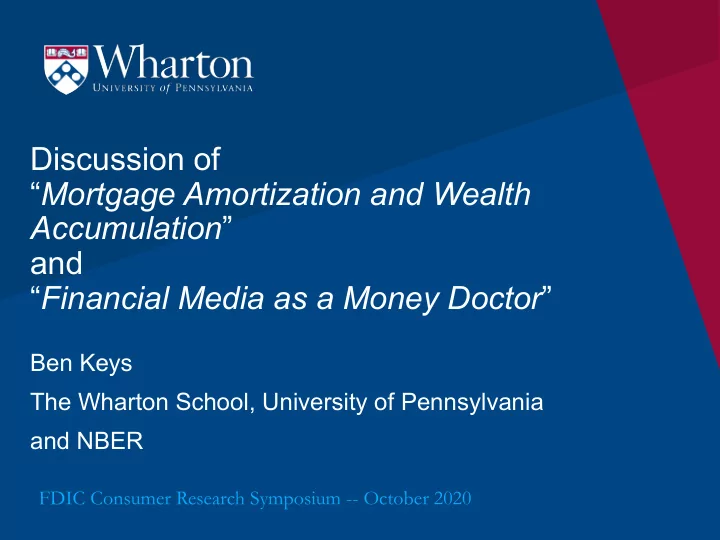

Discussion of “ Mortgage Amortization and Wealth Accumulation ” and “ Financial Media as a Money Doctor ” Ben Keys The Wharton School, University of Pennsylvania and NBER FDIC Consumer Research Symposium -- October 2020
Financial Decision-Making in Mortgage Markets • U.S. residential mortgage market: $11 trillion • Largest household liability – decisions in this market matter! • Especially in context of Great Recession • Big research questions from these papers: • Mortgage design and savings behavior – how does the mortgage amortization schedule affect wealth accumulation? • How can inattention and inertia in refinancing decisions be overcome? 2
Does Mortgage Amortization Crowd-Out Savings? • Uses Jan. 2013 interest-only mortgage reform in the Netherlands to examine the causal effect of mortgage amortization on savings • Complicated institutional setting, but basically transition from interest-only to fully amortizing mortgages for first-time home buyers • With no change in lending / underwriting DTI standards! • Using amazing administrative data, authors can decompose how homebuyers adjusted along many margins 3
Striking Figure 1 – Event study around mortgage reform • Powerful evidence of no crowd out! • Even 5 years out, households don’t undo effects of mortgage amortization altering their savings (not shown here) 4
1) How are homeowners saving so much more? • Figure 1 implies a response in either consumption or income • Or mismeasurement of non-housing wealth • but…Dutch data • Authors find large income response through hours worked channel • Very surprising that labor income is so elastic mid-recession • Would like to see event study for labor market variables 5
2) Longer Run Adjustments? • Homeowners may be able to bear this increased outflow for some time, but non-housing wealth starts to dip 6+ months out • Would like to see longer-run event study pictures to go with Table A7 • Selection out • different rates of refinancing, selling? • Show sample composition and balance over event study horizon(s) 6
3) External Validity – No Change in Underwriting • Many features of Dutch mortgage market are unique • Very high LTVs • Historically little amortization, even among elderly owners • Complicated treatment of MID, sinking fund, etc. • Key feature: Historically, even though loans were not amortizing, they were underwritten for DTI as though they were • In other contexts, reduced amortization have been used as “affordability” tools and lenders have adjusted DTI underwriting standards • e.g. Amromin et al. 2018, Dokko, Keys, Relihan 2019 7
Takeaways • Powerful new evidence on the importance of “forced savings” and homeownership as a wealth-building tool • Surprising to find that a key margin of adjustment is on labor market side during a recession, vs. adjusting non-housing savings or consumption • Dutch policy context of January 2013 is not easily extrapolated • Instituted mid-recession to give lenders more cushion (presumably), but didn’t seem to have negative effects on loan origination or non-housing savings • Other macroprudential policies would likely not hold underwriting standards fixed, and thus lead to larger distortions to the market 8
Financial Media as a Money Doctor • Homeowners make substantial financial mistakes by failing to refinance • Many refinancing applicants (16%) get their information from media • vs. 50% internet, 40% brokers, 33% friends/family, 30% bankers, 22% mail • Use variation in the timing of entry and channel position of Fox Business News (FBN) as quasi-experiments to see if refinance rates rise in response to greater media exposure • 2008: FBN in 30m homes • 2015: FBN in 80m homes (but decline of cable TV subscribers to 53m?) 9
Entry of Fox Business News • FBN grows in mid-2000s, now beats CNBC in ratings • Staggered entry across media markets • Looks like some concentrated regional growth (NE, SE, MW) 10
Concerns with staggered FBN entry 1) Correlated with other drivers of refinancing and related trends (house prices, income) that would allow more to qualify for refinancing • Need to see pre-trends of relevant economic variables 2) What is the relevant level of geography? Aren’t zip codes going to have correlated entry from common cable providers? e.g. Philadelphia zips = Comcast • Shouldn’t analysis be at “system” level or higher? 3) Estimating diff-in-diff with staggered treatment results is a weighted average of coefficients of underlying diff-in-diff estimators, see e.g. Goodman-Bacon (2018) • Would like to see event study plots for everything and decompose results based on timing of adoption to see where roll-out mattered most 11
Other issues • Estimates are both surprisingly large and precise • e.g. between estimator seems to have a t-stat of 100 (Table 9) • Are SEs double-clustered? Does zip-level cluster make sense given systems and media markets? • Triple-Diff “Beneficial to Refinance X Treat X Post” indicator is hard to interpret when Treat X Post is negative & significant • Treat X Post should be zero based on their hypothesis – so why not? • Challenging when benefit of refinancing is actually not observed, expect a lot of noise here • Should be concerned about offsetting coefficients between diff-in-diff and triple- diff 12
Concluding Thoughts • Authors are investigating an interesting hypothesis, namely whether business media affects refinancing decisions • We know from surveys they get info from media, but they also get it from elsewhere, hard to disentangle role of media • The success of this approach hinges on convincing event study figures that can rule out pre-trends for endogenous entry, and a stronger connection to financial benefits to refinancing 13
Recommend
More recommend